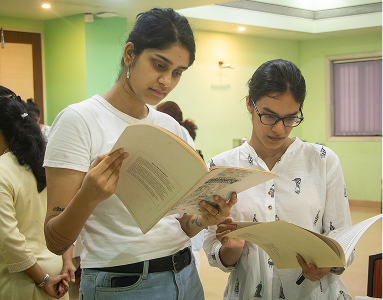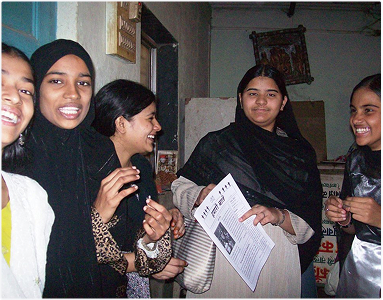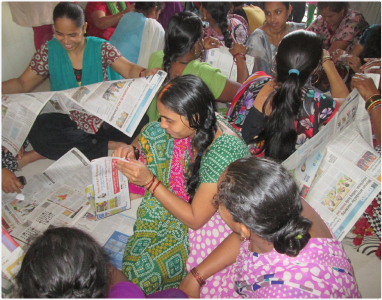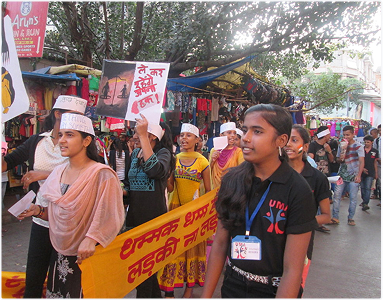
The early 70s witnessed the rise of the women’s movement in India. It brought together women from all walks of life on a single agenda to end women’s subordination and gender-based violence. Women’s groups mushroomed out of people’s homes, public parks or anyplace where they could sit together, discuss and plan their response to issues that caused much distress to half the population. They formed informal or formal groups that made visible to the public pressing issues such as gender-based violence, rape and sexual assault and demanded from the government measures to ensure the safety of women and girls in public spaces including the workplace.
Sonal Shukla, Nina Haems and Dineshwari Thonse were also very much part of the independent feminist movement in Mumbai. Bound by their firm belief that women have to rise out of obscurity and claim their place in society as equals, the three women thought it important to first create a gender justice hub in Asia.
Sonal, was synonymous with Vacha. She used different creative mediums such as poems, songs and storytelling to impart complicated messages on gender issues. She constantly encouraged girls and women to read, absorb and discuss issues that hindered a just and violent free society. Apart from emphasizing the need for solidarity among women-centric organisations and individual activists, Sonal focused on adolescent girls who she believed needed to play an important role in ushering in change in our society.
In 1987 Sonal Shukla, Dineshwari Thonse, Nina Haeems and Meenal Patel started Vacha as an experiment that combines non-formal education with participatory action and research to initiate social change. It was registered as a Trust in the year 1990.
Until her very last day, Sonal worked towards empowering girls from underprivileged backgrounds by empowering them with skills that can make a sea change in their lives. Vacha continues to work towards a world without exploitation, oppression, discrimination and violence against women or any other section of society.
The focus is to empower girls and women through non formal education & information sharing culminating in active participation in civic life as equal citizens while charting their own lives. The interventions focus on facilitating girls to gain life skills, overcome their fear or inhibitions, explore their own potential and fulfil their aspirations.
Vacha believes that experiential learning must start early. Young children at the age of 10 are enrolled at these centres where they are exposed to various skills and information. They are encouraged to reclaim public spaces. The young kishoris learn through sports, arts and crafts and films. Basic computers literacy and English-speaking skills are taught at the centres to help them cope with their school education. They also learn from the older kishoris who mentor them to overcome challenges and participate in civic life.
The 17 Vacha centres in Mumbai and Thane districts focus on developing life skills and competencies through experiential learning. The Creating Spaces programme encourages kishoris to read and stay updated with current affairs. The library houses over 5000 books in 7 regional languages, allowing kishoris and kishors to read in their home language. Digital books, educational material, games, documentaries, and animated films are also available. Films on India's Freedom movement and women's role in the struggle are popular among girls.
To be able to reach out to a larger spectrum of children, Vacha conducts activities in municipal schools. These include remedial language classes, screening of documentary films, gender sensitising workshops, competitions in art, elocution and essay writing etc. Career guidance fairs are also held regularly to help children realise the vast options that are available to them.
In bastis, girls are traditionally silenced, confined to homes, and burdened with chores. Vacha creates spaces for kishoris to reclaim public areas and express themselves. Workshops on rights, arts, writing, and skills build confidence for their future. Sports and outdoor activities are crucial for development. Regular arts, photography, and creative writing classes are also offered, empowering girls to voice their opinions and contribute to their communities.
The programme emphasizes the importance of working with women, boys, community leaders, civil society organisations and civic authorities in the programme of girls' empowerment to foster a holistic approach to gender equity. By engaging all stakeholders, it aims to challenge societal norms, promote shared responsibility, and create sustainable change through collective action.
Partnering young adolescents (Kishors) is Indispensable for maintaining the harmony and creating a conducive environment for the kishoris. The Partnering Gender Equity programmes help Kishors to understand their own patriarchal mindset and break free from it. Vacha kishoris take the leadership roles in all the programmes with the Kishors partnering and learning from them. Kishors are encouraged to question the status quo of society and support kishoris to become equal partners in everyday life. This facilitates changing the prevalent patriarchal mindset of future generations.
Mothers are important to Vacha's success. Mother's meetings explain program activities and goals. Vacha provides trainings for mothers, highlighting opportunities and necessary skills for their daughters. This empowers mothers to support their daughters' aspirations. By informing and engaging mothers, Vacha ensures a collaborative approach, fostering understanding and support within the community. This involvement reinforces the program's impact, creating a supportive environment for girls to thrive and access better opportunities.
The support of community stake holders helps in creating a conducive ecosystem that is safe and secure for the kishoris. The Partnering Gender Equity programmes of Vacha ensure that the community encourages and participates in creating such an environment. The encouragement and support from Nagarsevaks, Asha Workers, Community health volunteers, Anagnwadi workers, police, govt health personnel and the municipality goes a long way in building confidence in the kishoris. Private service players such as banks and school authorities too are encouraged to help in providing necessary information and help to the kishoris.
As an experienced NGO in imparting life skills to kishoris and Kishors, other NGOs learn from Vacha. Training sessions and workshops are conducted where Vacha staff impart skills acquired over the years to staff from other NGOs. Vacha also takes the lead in collaborations with NGOs to achieve common goals.
The focus of Empowering Aspirations programme is to facilitate kishoris improve their living conditions, access to education, healthcare and employment opportunities by empowering them with life skills that foster self-esteem and confidence to participate in the economic and civic life of society as equals.
Vacha's "Empowering Aspirations" programme tackles socio-economic gaps by equipping marginalized kishoris with vital 21st-century skills. Through workshops and sessions, they develop critical thinking, creativity, collaboration, and digital literacy. Problem-solving, communication, and leadership are emphasized, alongside internet literacy and social skills. The program nurtures curiosity, innovation, and global awareness, while also addressing environmental concerns and personal health. By nurturing these skills, Vacha empowers girls to improve their lives and navigate the demands of the modern world, bridging the opportunity divide.
Vacha tackles patriarchy and discrimination by educating young kishoris. They learn to recognize and challenge these issues, voicing their opinions and making informed choices. By understanding patriarchal influences, they break free from imposed decisions, exploring their potential for economic and social growth. Addressing child marriage, Vacha empowers girls with knowledge of their rights and laws. This encourages them to prioritize education and economic independence, leading to delayed marriages. Vacha's interventions develop self-awareness and agency, enabling girls to shape their futures and challenge societal norms.
A common factor in bastis is the lack of safe and comfortable spaces for adolescent kishoris to participate in physical activities. The few public parks and common spaces in bastis are almost always occupied by boys and men while girls feel either uncomfortable or are restrained from utilising these facilities.Khele Kishori programme includes physical activities, competitive sports and games not only as a means to improve physical and mental health but to get girls and women realise that they have an equal right to such public spaces in society. Vacha kishoris take the lead to hold regular sports events, street plays and other cultural activities in public spaces and send the message that they are equal partners in society.
Understanding their bodies and its nutritional requirements for a healthy adulthood is yet another important aspect of the Empowering Aspirations programme at Vacha.All Vacha kishoris avail of regular health check-up conducted at the centres and are provided with supplementary nutrition if found deficient. Workshops on understanding menstruation and menstrual hygiene that are crucial to good health of the girls and women are also conducted regularly. The participants learn about the various organs of the body, its location and functions at the Vacha centres.
This results in their ability to negotiate her own age of marriage and pregnancy, demand clean and hygienic public utility services, understand and participate in taking up issues that harm the environment. As adults they are able to make the most of the opportunities that come their way and also have a better chance of improving their economic lives.
Every hour, at least two women are sexually assaulted and every six hours, a young married woman is beaten to death, burnt or driven to suicide. It is appalling to learn that 28.4 per cent of pregnant women suffer domestic violence. As a result of violence, women suffer social isolation, unemployment, income loss, poor self-care and fail to provide childcare, which is a grave concern.
Vacha leads the way through advocacy and information sharing with civil society to encourage every individual to take the oath of “No to Violence”.
Vacha empowers marginalized girls (kishoris) to break silence and become active citizens. Through education and confidence-building, they gain agency. Kishoris publish biannual community newsletters, sharing their perspectives and inspiring others.
Public release events, featuring performances and displays on gender issues, amplify their voices. This process builds their self-esteem and shows the community the value of Vacha's work, turning silent girls into active contributors.
Informed participation in civic life is one of the main goals of these interventions. Experiential learning facilitates and empowers kishoris with knowledge and confidence to take on leadership roles in their communities.
Kishoris identify issues that they face in the bastis, write letters seeking intervention and also meet the authorities in person to impress upon them the urgency for redressal. Vacha can proudly claim that this entire procedure followed by the kishoris id a result of all the interventions by Vacha over the years.

The Learning Community for Adolescent Girls, launched in 2012 by Emerging Market Foundation-Empower and implemented by Vacha, aims to develop leadership skills among 150 girls aged 12-19 across 15 communities in Mumbai and Dombivli. Their leadership extended beyond project ideas to planning and implementation.

We have been running a scholarship program since 2015 to support Kishori girls' higher education and empower them financially. The stipend also incentivizes attendance in classes like spoken English, photography, and computers at Vacha centres. From 2015 to 2022, over 1,050 girls received support.

AMHI aims to make mental health services accessible to adolescents aged 10-19, including non-binary genders. Vacha uses a three-pronged approach: community-based mental health programs, preventive education in schools, and community awareness. Safe, gender-sensitive spaces are created for young people to share their issues without judgment.

The project aims to create a safe space for girls to discuss topics like menstruation, which are rarely talked about. Having trusted ‘didis’ from their communities lead these sessions helps girls feel comfortable. The platform allows them to use skills gained at Vacha and empowers many young girls in their bastis.